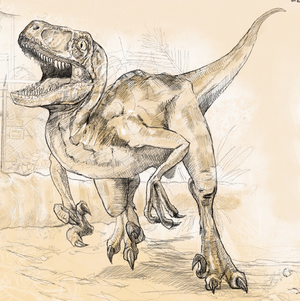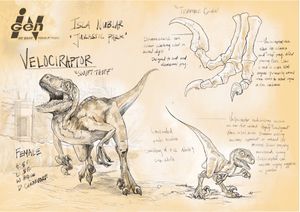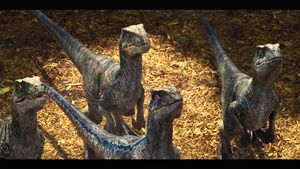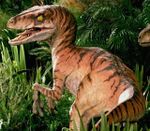Difference between revisions of "Velociraptor (Film Universe)"
| Line 1: | Line 1: | ||
{{WIP}} | {{WIP}} | ||
| + | {{Infobox character | ||
| + | | colour = <!-- headers background colour; the foreground colour is automatically computed --> | ||
| + | | name = Velociraptor | ||
| + | | series = <!-- use without the italic on the outside --> | ||
| + | | image = Velociraptor_(Film_Universe).png | ||
| + | | image_upright = | ||
| + | | alt = | ||
| + | | caption = | ||
| + | | first = | ||
| + | | last = | ||
| + | | appearances = [[Jurassic Park (1993 Film)|Jurassic Park]]<br />[[The Lost World: Jurassic Park (1997 Film)|The Lost World: Jurassic Park]]<br />[[Jurassic Park III (2001 Film)|Jurassic Park III]]<br />[[Jurassic World (2015 Film)|Jurassic World]] | ||
| + | | creator = | ||
| + | | portrayer = | ||
| + | | voice = | ||
| + | | lbl1 = | ||
| + | | data1 = | ||
| + | | lbl2 = | ||
| + | | data2 = | ||
| + | | lbl3 = | ||
| + | | data3 = | ||
| + | | info-hdr = | ||
| + | | noinfo = | ||
| + | | fullname = | ||
| + | | nickname = | ||
| + | | alias = | ||
| + | | species = <!-- for non-humans only --> | ||
| + | | gender = <!-- if not obvious --> | ||
| + | | occupation = | ||
| + | | affiliation = | ||
| + | | title = | ||
| + | | family = | ||
| + | | spouse = | ||
| + | | significantother = | ||
| + | | children = | ||
| + | | relatives = | ||
| + | | religion = | ||
| + | | nationality = | ||
| + | | key events = [[Isla Nublar Incident (Film Universe)|Isla Nublar Incident]]<br />[[Jurassic Park Incident (Film Universe)|Jurassic Park Incident]]<br />[[Jurassic World Incident (Film Universe)|Jurassic World Incident]] | ||
| + | | status = | ||
| + | | lbl21 = | ||
| + | | data21 = | ||
| + | | lbl22 = | ||
| + | | data22 = | ||
| + | | lbl23 = | ||
| + | | data23 = | ||
| + | | extra-hdr = | ||
| + | | lbl31 = | ||
| + | | data31 = | ||
| + | | lbl32 = | ||
| + | | data32 = | ||
| + | | lbl33 = | ||
| + | | data33 = | ||
| + | }} | ||
The '''Velociraptor''' was a species of dinosauria that lived roughly 75 to 71 million years ago during the later part of the Cretaceous Period. It was the first species to be revived by [[InGen (Film Universe)|InGen]] in 1986 through their [[De-extinction (Film Universe)|De-extinction]] process. They were planned to be exhibited at [[Jurassic Park (Film Universe)|Jurassic Park]] before its abandonment but were later revived for [[Project I.B.R.I.S. (Film Universe)|Project I.B.R.I.S.]] as part of a research program to test their intelligence for real-world applications. | The '''Velociraptor''' was a species of dinosauria that lived roughly 75 to 71 million years ago during the later part of the Cretaceous Period. It was the first species to be revived by [[InGen (Film Universe)|InGen]] in 1986 through their [[De-extinction (Film Universe)|De-extinction]] process. They were planned to be exhibited at [[Jurassic Park (Film Universe)|Jurassic Park]] before its abandonment but were later revived for [[Project I.B.R.I.S. (Film Universe)|Project I.B.R.I.S.]] as part of a research program to test their intelligence for real-world applications. | ||
Revision as of 13:40, 24 June 2016
| Velociraptor | |
|---|---|
 | |
| Appearances | |
The Lost World: Jurassic Park Jurassic Park III Jurassic World | |
| Key Events | Isla Nublar Incident Jurassic Park Incident Jurassic World Incident |
| Production Notes | |
The Velociraptor was a species of dinosauria that lived roughly 75 to 71 million years ago during the later part of the Cretaceous Period. It was the first species to be revived by InGen in 1986 through their De-extinction process. They were planned to be exhibited at Jurassic Park before its abandonment but were later revived for Project I.B.R.I.S. as part of a research program to test their intelligence for real-world applications.
Description
Velociraptors were medium sized carnivorous pack hunters. There are three known subsets, plus notable sexual dimorphism.
Appearance and Physical Attributes
There are three distinct variations of Velociraptor which were cloned by InGen, not counting sexual dimorphism seen within each individual version. However, despite the surface level variations, each sub-species remains relatively similiar in terms of physical attributes. Each species is roughly 6 feet tall, 13 feet long and weigh over 350llbs. They're each covered in taut, leathery skin not unlike that of a Komodo Dragons, with degrees and variation seen between subset and sexes.
Notably, they feature a 6 inch retractable sickle "killing claw" on the inner toes of each foot, which is one of the animals most signature deadly weapons. While the skull structure varies between each subset, they all feature a pronounced orbital socket with distinct antorbital fenestra ridges. Much like many modern reptiles, these animals mouths were lined with a strong lip structure.
Agile and remarkably strong, Velociraptors are incredible jumpers and can reach speeds of up to 50-60mph in the open.
Behaviour and Personality
Intelligent and deadly, Velociraptors are by far the most dangerous animals cloned by InGen. While incredibly aggressive, they are also very social animals with a complex pack dynamic. Like an inverse of a pride of lions, Velociraptors are typically observed with a few females leading the pack, with males making up the majority of the population.
Velociraptors typically stay near their nest, and venture out further to hunt - though they have been observed leaving their territory if they still perceive previous intruders as a threat. Velociraptors are particularly defensive of their nests and eggs.
The position of 'Alpha' within the pack is a very important part of their dynamic, and is typically respected. However, the animals have been known to fight amongst themselves to earn that spot - and those fights can often prove deadly.
Each of the three raptor variations seemingly share the same 'language', displaying a complex and unique series of screeches, barks, growls and hisses.
History
Classification
InGen's Version 1.0
| Velociraptor Version 1.0 | |
|---|---|
 Artwork from the Jurassic Outpost Field Guide by Ryan Shumate | |
| Appearances | |
The Lost World: Jurassic Park | |
| Information | |
| Species | Velociraptor (Version 1.0) |
| Production Notes | |
This subset of Velociraptor is not only the first version of raptor cloned by InGen, but also the first ever successful dinosaur species brought back via 'De-extinction' in 1986. Version 1.0 is known to exist natively on both Isla Nublar and Isla Sorna.
Sexual dimorphism
Both the males and females have piercing, veiny, yellow eyes and nearly identical physical builds. The largest difference between each sex is color, and number per pride.
Females
All dinosaurs created for Jurassic Park by InGen were intended to be female, and as such these were the Velociraptor on display within Isla Nublar.
The female Velocirapors are primarily a muted orangeish brown, with darker brown horizontal speckling and splotching overtop with a gunmetal green hue throughout. Their underbelly is a lighter beige color, which transitions to the darker hues the higher it goes up the body. The females have very little distinct striping or spotting, and can appear rather uniform in color until closer, well lit inspection.
Female V.1 Velociraptors can also be found on Isla Sorna, but they are fewer in each pack than male
Males
Natural born male v.1.0 raptors are a more vibrant orange than their female counterparts, with a beige underbelly and less dark splotching overall. They're easily distinguished from the female packmates as they are covered in vertical dark brown stripes, not entirely unlike that seen in Bengal Tigers.
History
The initial batch of Velociraptors were bred Isla Sorna, and transferred to Nublar in 1990 once they had hit adulthood. Originally, 8 raptors were brought to Jurassic Park and were given a larger free-reign paddock. However, the Alpha known as 'The Big One' clashed with many of the other females, and was believed to have killed all but two of the others. After that incident, those three were moved to a smaller paddock for better supervision. Though unsubstantiated, it is possible that these surviving packmates had changed sex to male, leading to better temperance and pack dynamics.
During the 'Jurassic Park Incident' Dr. Alan Grant alongside Tim and Lex Murphy stumbled upon a hatched Velociraptor nest in the wild, with distinct juvenile raptor footprints around it. Given this information, it seems likely that 'The Big One' did not kill all 5 of the other Velociraptors, but only some while others escaped and bred in the wild. It is believed, yet unconfirmed, these wild raptors traveled to the northern sect of Isla Nublar, and nest in the geothermal caves.
The Velociraptors on Isla Nublar are responsible for at least 3 deaths: Joffery, Ray Arnold, and Robert Muldoon.
The V.1 Velociraptor packs on Isla Sorna favor the plains and forest towards the mid-Northwest of the island. This territory extends into the nearby abandoned InGen workers village, which is now one of the most dangerous locations on the island. The pride is dozens strong, and is populated by a roughly 6:1 male/female ratio. InGen troops were forced to traverse their territory after a Tyrannosaur attack during the 1997 incident, and suffered heavy casualties as a result which included Ajay Sidhu.
InGen's Version 1.5 (Project I.B.R.I.S.)
| Velociraptor Version 1.5 | |
|---|---|
 | |
| Appearances | |
| Information | |
| Species | Velociraptor (Version 1.5) |
| Production Notes | |
Version 1.5 Velociraptors are in reality the third acknowledged subset of Velociraptor created by InGen 2012. Based upon the V.1 genome, these raptors were custom crafted by Dr. Henry WU for the I.B.R.I.S. program. Each v.1.5 Velociraptor has been programmed with unique, customized DNA.
Very similiar in build and looks to the v.1.0 Velociraptors, v.1.5 are most easily identified by their unique color schemes. Further, they have thicker, more flexible rubbery skin, featuring more visible fleshy tones. Their eyes are yellow much like v.1.0, however are more translucent and do not have the noteworthy visible vein structures seen in their counterparts.
While roughly the same size and shape as their v.1.0 predecessors, they are notably stockier with other various differences. There are 4 different V.1.5 raptors, each with their own genetic, physical, and behavioral discrepancies. To discover more, visit their individual pages below:










